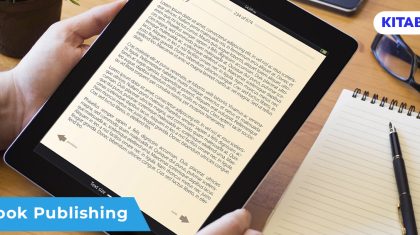
Can I Turn a Book into an eBook?
If you already have published works or existing books under your belt, congratulations! You have already completed one of the most challenging processes in the publishing industry. However, while a substantial number of readers prefer physical books, the digital landscape is evolving.
With the rise of eReaders, tablets, and smartphones, the demand for eBooks has never been higher. The worldwide revenue of eBook publishing was $52.8 billion in 2023 and is expected to reach $58.3 billion in 2027. So, if you are an author or publisher, you might be wondering, “Can I turn a book into an eBook?” The short answer is yes, and the process has never been more straightforward.
In this blog, we’ll explore the step-by-step process that will help you understand how you can turn a book into an eBook, giving you a glimpse of everything you need to do to get started.
So, let’s begin!
Table of Contents
I. Why Should You Convert Your Book into an eBook?
- Unparalleled Accessibility
- Convenience
- Versatility
- Wider Adoption
- Eco-Friendliness
- Cost Effectiveness
II. Step-by-Step Process to Convert Physical Books into eBooks
Why Should You Convert Your Book into an eBook?
Instead of asking the question, “Can I convert a book to an eBook?” Most writers, publishers, or even businesses ask the question, “Why do I need to convert books to eBooks?” There are several compelling reasons why this is not just an add-on for your physical assets but can also help you reach a wider audience.
Explore: Digital Publishing Platform for Association and Societies
Some of the reasons why you should consider converting your books to eBook format include:
Unparalleled Accessibility
Convenience
Remember going to school or university with a bag full of books? Well, that is exactly what you still need to do if you have multiple books that you need to read at a time.
With eBooks, readers can carry an entire library in their pocket. You can simply download the books you need in your eBook Reader or device. So whether you are at home or traveling, you can access multiple books anytime and anywhere you, please.
Versatility
Unlike their print counterparts, eBooks offer unparalleled versatility. They can seamlessly integrate multimedia elements such as videos, audio clips, and interactive graphics, enriching the reading experience and captivating your audience in innovative ways.
Wider Adoption
Not every user enjoys reading a book word by word. Some prefer to consume content by having it read out, especially if they have a habit of listening to the eBook while traveling or driving.
This also helps those with physical limitations. For example, visually impaired readers can benefit from an eBook’s audio narration. They can also increase the font size or gain additional information from multimedia additions in interactive eBooks, making them accessible and engaging to a larger demographic.
Eco-Friendliness
By eliminating the need for paper, ink, and shipping, you reduce your carbon footprint and contribute to a more sustainable future. By going digital, you’re doing your part to conserve resources and minimize waste.
Cost Effectiveness
Producing and distributing physical books can be costly, with expenses ranging from printing to shipping. By opting for eBooks, you eliminate these overheads, making your content more affordable for you and your readers.
Thus, you can turn your book into an eBook and get many benefits. It not only opens up new opportunities for your content but also aligns with the demands of today’s digital-savvy readers.
Step-by-Step Process to Convert Physical Books into eBooks
Now that we know just how crucial it is to embrace the power of the eBook platform let us understand the steps involved in this process. Converting your physical book into an eBook may seem daunting at first, but with the right approach and tools, it can be a straightforward process.
Here’s how:
Step 1: Digitize Your Content
The first step in converting your physical book into an eBook is to digitize your content. This involves scanning each page of your book to create digital images.
You can use a high-quality scanner or even opt for professional scanning services like KITABOO’s end-to-end ePub conversion platform, which is a great way to digitize books.
Step 2: Choose the Format
Once you have digital copies of your book pages, it’s time to choose the eBook format. Popular formats include ePub, MOBI, and PDF.
Each format has its own specifications and compatibility with different devices, so choose the one that best suits your needs and target audience.
Step 3: Convert to Text
Now comes the main part. After digitizing your content, you must convert it into editable text format. This step involves using Optical Character Recognition (OCR) software to extract text from the scanned images. Make sure to proofread and correct any errors to ensure accuracy.
Step 4: Format the eBook
With the text extracted, it’s time to format your eBook for optimal readability and user experience. Pay attention to elements such as font styles, spacing, and layout.
Even if your published book is formatted and professional, you must thoroughly examine each page and content, as it needs to be optimized, even for your eBook version. You may also need to add navigation features such as hyperlinks and a table of contents for easy navigation.
Step 5: Add Multimedia (Optional)
If your content can be enhanced using visual or audio elements, consider adding these elements to enrich the reader experience and make your eBook more engaging. With videos, audio, or even images to enhance the concept or the content, you allow your readers to gain additional context and gain an immersive learning experience.
Step 6: Test and Preview
Before publishing your eBook, it’s essential to test and preview it across different devices and platforms. This ensures compatibility and allows you to identify any formatting issues or errors that must be addressed before distribution.
Step 7: Hit Publish!
Once you’re satisfied with the formatting and quality of your eBook, it’s time to publish it.
You can choose to self-publish through platforms like Amazon Kindle Direct Publishing (KDP) or even promote your book using your own eBook store. Be sure to follow the publishing guidelines and requirements for your chosen platform.
Once you’re satisfied with the formatting and quality of your eBook, it’s time to publish it.
You can choose to self-publish through platforms like Amazon Kindle Direct Publishing (KDP) or even promote your book using your own eBook store. Be sure to follow the publishing guidelines and requirements for your chosen platform.
Conclusion
By now, you will have a clear answer to your question, “Can I turn a book into an eBook?” As we’ve explored, eBook conversion offers vast benefits, ranging from enhanced accessibility and cost-effectiveness to environmental sustainability and market reach. By embracing digital formats, you not only future-proof your content but also align with the evolving preferences of modern readers.
If you are ready to unlock the full potential of your physical content and want to reach a wider range of readers, converting your physical book into an eBook is the ideal step. With KITABOO by your side, this process can be a lot simpler. Whether it is enhancing your content by embedding multimedia and interactivity features or managing digital distribution, the platform can help you get it all done. You can integrate this with your existing LMS or eStore and even offer protected and offline access to your readers.
Do you have physical books or even podcasts that you would like to convert into eBooks? Contact our team of experts today to see how you can convert your valuable content into multiple formats that can reach the audience on multiple platforms.
Also Check:
Discover how a mobile-first training platform can help your organization.
KITABOO is a cloud-based platform to create, deliver & track mobile-first interactive training content.



